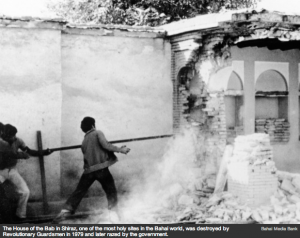Source: National Post, http://goo.gl/UvSn0f
Sasha Eskandarian, National Post | August 19, 2014 6:51 AM ET

It’s not difficult for me to remember the horrible days of hardship I experienced as a Baha’i teenager, living in Shiraz, Iran, in the early 1980s. As a member of the Baha’i faith, the largest religious minority community in Iran, life became harder and harder for us as we were being attacked and terrorized in the aftermath of the 1979 Islamic Revolution. Baha’i families in my hometown of Shiraz, including my own, lost their livelihoods. We were scared for our lives, as well.
In those years, many members of Baha’i institutions, both at the national and local levels, were arrested and killed. Some were tortured in an effort to force them to recant their faith. Others mysteriously disappeared without a trace. Baha’i homes were attacked by mobs, and some were burned. Even the dead were targeted: Baha’i cemeteries around the country were attacked and destroyed.
I vividly remember the Baha’i cemetery in Shiraz. We called it the “Everlasting Garden,” a place of peace and tranquillity. We visited our departed family and friends’ graves, including those of my younger brother and my grandmother. We prayed and meditated there in a loving and spiritual atmosphere.
I remember going there after it was attacked, along with a group of youth, to help restore what was left, to plant flowers, water the garden, dig graves in preparation of burials. At a time of crisis, it was a joy to render this service to my community.
In 1983, 10 Baha’i women from Shiraz were hung because of their faith. I knew them all. The youngest, Mona Mahmudnizad, was a close friend of mine. We had such a good time together, including many sleepovers where we shared our youthful confidences. She was only 17 years old, and was buried in our “Everlasting Garden.”
Soon after, I left Iran to come to Canada. I was determined not to look back. I wanted to close this chapter of my life forever. I even changed my name, hoping that it would bring a new beginning.
Thirty years later, I realize how childish it was to think that I could turn my back on such injustices. How could I forget my family and friends? After all that time, the situation hasn’t changed much in Shiraz. Many more Baha’is were killed since I left; many others are in prison. The attacks continue, even if they are overshadowed in the media by other instances of bloodshed elsewhere in the Middle East.
Now, the “Everlasting Garden” is being completely demolished to make way for a new sports and cultural complex. Iran’s Revolutionary Guards are destroying whatever was left of the cemetery.
As early as the 1980s, the main buildings were destroyed after the property was confiscated by the government. The Guards now are going further. They’ve started digging out bodies — including those of my brother, grandmother and dear friend Mona — from their resting graves, and placed them in an open canal. They even held a public celebration of the demolition’s progress, to which the media was invited. The commander of the Guards gave a speech attacking Baha’is while standing on top of our loved one’s graves, or what is left of them.
How much longer do Baha’is in Iran need to suffer? Are we hearing the voices of the innocent?
I share the suffering of those in Shiraz. They are my family and friends, whose only aim is to follow the precepts of their faith, and work for the betterment of mankind. I invite others to raise their voices to protest this outrageous wrongdoing and help stop this injustice.
National Post
Sasha Eskandarian is a Baha’i currently living in Mississauga, Ontario. She is a Research Manager in the department of Pathology and Molecular Medicine at McMaster University.
Leave a Reply